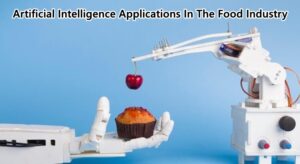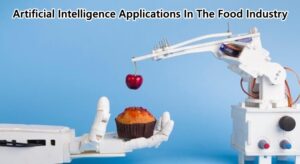artificial intelligence (AI) , Many technologies in the past redefined entire industries by bringing production and management to a new level.
Industrial practices are going through the so-called fourth industrial revolution, as artificial intelligence (AI)-machine learning (ML) solutions integrate with existing manufacturing practices.

The food industry is also changing as it introduced AI, ML, and other advanced technologies to improve efficiency, increase safety, reduce risks, etc. Digital transformation has reached the food and beverage industry, bringing new business opportunities and optimizing existing systems. Let’s see how AI and ML are changing the food industry for the better.

Table of Contents
artificial intelligence (AI)-machine learning (ML) Applications in Food Processing and Management
Food processing is one of the most complex industries. It takes a lot of time and effort to produce food. Food producers have to track many factors, and materials, maintain all kinds of machines, deal with packaging, and much more. Even when the processing is completed, and all of the food is packed and ready to ship, it still has to go through extensive quality testing.
As you can imagine, all of these processes take a lot of time, effort, and skilled employees. Well, AI can simplify things more than any other existing technology. It can reduce food processing times, increase revenue, and boost the customer experience. Let’s see how AI applications revolutionize the food industry.
1. artificial intelligence (AI)-machine learning (ML) for Sorting Food
The food sorting process traditionally needs hundreds of workers standing in line, sorting good food from the bad by hand. It’s a monotonous process, and no matter how skilled the workforce is, some low-quality foods will slip below the radar and reach consumers.
AI and ML don’t make mistakes, so it makes sense to use them for sorting food. For example, an AI-based solution can accurately sort potatoes based on their size and weight. It can easily select ideal potatoes for baking chips and those better for making French fries. Moreover, AI can sort vegetables by color to reduce food waste. As long as you provide certain quality requirements, AI will ensure that all processed food meets them.
The best part is that AI will do most of the work automatically. Automation allows companies to save money by reducing manual labor. AI-driven food machines have advanced x-ray scanners, lasers, cameras, and robots that all work together to analyze food quality and sort it according to your instructions.
2. artificial intelligence (AI)-machine learning (ML) in Supply Chain Management
New food safety regulations are introduced all the time to increase transparency in supply chain management. AI algorithms use artificial neural networks to monitor food shipments throughout all stages of the supply chain. That ensures that the food meets all safety standards.
The role of AI in the food industry largely focuses on creating accurate forecasts for inventory management and pricing. That way, businesses will be one step in front of current trends, allowing them to plan shipments ahead of time. This approach leads to less waste and lower shipping costs. Most food industry businesses ship products all over the world, making it increasingly hard to track shipments. However, AI provides a better overview of the entire operation, allowing businesses to get the most out of every shipment.
3. Food Safety Compliance
Safety is the top priority for all food processing businesses. All employees and workers who come in direct touch with food have to wear proper costumes and comply with safety standards. However, tracking hundreds of employees and making sure that everyone follows the rules is easier said than done.
AI-enabled cameras can monitor all workers and notify managers in case a rule is broken. The AI can quickly identify safety issues such as not wearing proper food protection gear or not complying with the rules. The AI can monitor production in real-time and send warnings directly to workers or their managers.
4. Product Development
Food producers have to look for new recipes and ingredients used to improve existing products and find new recipes. Traditionally, food industry representatives ran surveys and interviewed hundreds of consumers to identify trends and find new opportunities.
Of course, ML and AI are much better at analyzing data, and they can handle multiple data pipelines at the same time. Moreover, you can analyze data from different demographic groups, sales patterns, flavor preferences, etc. In other words, AI can help increase product personalization according to the customer’s personal preferences.
That means that food industry businesses can use AI to find the most popular flavor combinations and develop their products according to what they find. Moreover, the entire product development process becomes much faster, more affordable, and less risky.
5. artificial intelligence (AI)-machine learning (ML) with Cleaning Process Equipment
Making sure that all food processing equipment is clean is another concern for
all food producers. All machines and pieces of equipment have to be decontaminated and 100% cleaned before coming in touch with food. Taking humans out of the equation can help producers reach a higher level of cleanliness, as all processing is handled by AI-controlled robots and machines.

But automation doesn’t mean that the final product is clean and safe for consumption. However, AI-based sensor technology can help increase food safety, while reducing energy and water consumption for cleaning equipment.
A self-optimizing cleaning system is able to remove the smallest food particles from the system using optical fluorescence imaging, ultrasonic sensors, and other advanced technologies. The AI monitors the entirety of the system for microbes, germs, and food particles that could harm food quality.
6. Growing Better Food
Farmers also use AI to improve their yields by optimizing growing conditions. They already use AI-powered drones and advanced monitoring systems that track temperature, salinity, the effects of UV lights, etc.
Once the AI understands which factors impact food quality, it calculates what every plant needs to grow perfect quality foods. Moreover, AI can also detect plant diseases, pests, soil health, and many other factors that impact food quality.
Conclusion:
We can say that AI and ML are completely revolutionizing the entire food industry by reducing human errors and increasing safety standards. AI also improves food processing accuracy, reduces waste, and leads to better product quality.
AI is the perfect solution for the food industry because it improves all operational practices, including food transportation and the quality of service. It’s a win-win situation for both the customer and the industry, and we expect AI to keep improving the food business even more in the future.
With NanoPro, we provide food processing consulting services for industrial food businesses that produce at different scales. We produce the most suitable solutions for your needs and support you in applying them to your projects. We have knowledge and experience in different fields in the food industry

